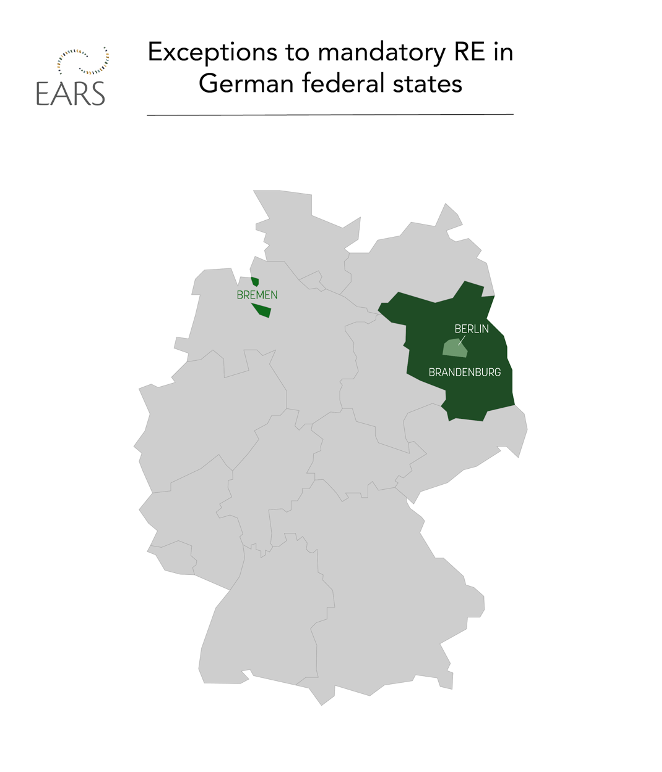Coping with diversity in Religious Education in Germany
Coping with diversity in Religious Education in Germany
Religious Education is subject to recurring discussions in Germany, which have mainly revolved around the issue of dealing with religious diversity.
This article is part of our series on the role of religion in education across Europe.
Religious education (RE) is the only school subject mentioned in the German Basic Law (constitution).[1] It is a mandatory subject given by religious communities at public schools in almost all German federal states, except in Berlin, Brandenburg, and Bremen. RE is also subject to recurring discussions, which have mainly revolved around the issue of dealing with religious diversity in the past decades.[2]
On the legal context of RE
The special status of RE is defined by the Basic Law: it is a regular school subject to be taught “following the principles of the concerned religious communities.”[3] This means that the formal and financial framework for RE is provided by the state, while the content of RE and the accreditation of teachers are left to religious communities. The achievements attained in RE are just as relevant for moving up to the next grade as in other subjects.[4] The state must be strictly neutral in terms of religion and worldview and ensure that RE follows the fundamental educational aims established in state laws on the subject.[5]
Owing to the standing of religious freedom as a basic constitutional right, students have the right to opt out of RE.[6] Nevertheless, those who do not want to take part in confessional RE must attend Ethics or other substitute lessons. In most federal states, students aged 14 years and above can make this decision without parental consent.[7]
Diversification of RE in Germany
In contrast to most other federal states in Germany, where confessional RE is a mandatory subject, it is offered as a voluntary subject in schools in Bremen,[8] Berlin,[9] and Brandenburg.[10] Pupils in these federal states can also attend teachings given by worldview organisations, such as Life Lessons provided by the Humanist Association.[11] Non-confessional teachings on religion in general, such as the subject ‘Life Plans – Ethics – Religious Knowledge’ (in Brandenburg)[12] or ‘Religion’ (in Bremen)[13] are offered in public schools as well, whereas lessons in Ethics were introduced as a compulsory school subject in Berlin[14] in 2006.[15] [16] Since the Basic Law only recognises confessional RE, RE in these states is not exactly defined as RE by the law, but is still treated the same.[17]

In the other 13 federal states, confessional RE is a mandatory subject, at least on paper. In practice, there are quite big differences concerning both the regulations and offers from state to state. For example, pupils in Sachsen-Anhalt must participate in RE classes or ethics lessons,[18] while students in North Rhine-Westphalia are obligated to take part in either RE classes or (Practical) Philosophy.[19] In some federal states (Lower Saxony, North Rhine-Westphalia, and Baden-Württemberg), RE even takes place on a denominational-cooperative basis, such as the cooperation between Catholics and Protestants.[20] Since the early 1990s, a non-denominational model of dialogical interreligious pedagogy called ‘RE for All’ has been practised in Hamburg.[21]
Recent developments and controversies in the context of religious plurality
Up to the 1960s, RE in public schools was taught in close cooperation with established churches (the Catholic and Protestant churches), which aimed to introduce the gospel to the pupils as the liberating Word of God.[22] Today, 60 years later, every institution which carries a share of responsibility for RE in schools faces the challenge of accommodating religious diversity and cultural heterogeneity in and through religious education.[23] [24]
The debates about RE in the context of religious diversity have led to two major changes. On the one hand, so-called substitute subjects for confessional RE were introduced, which reflect dialogue-based concepts.[25] On the other hand, there is more diversity in RE offered, including, in addition to the Catholic and Protestant churches, numerous other Christian communities, the Jewish community, as well as Buddhist, Christian Orthodox, Alevi, and Islamic religious communities, and the Humanist Association.[26]
While interreligious dialogues in and through confessional RE are considered desirable by religious communities, several researchers from philosophy and religious studies take a different position. They reject the confession-oriented approach and call for a respectful and distanced attitude towards religions. For them, non-confessional teachings on religions would enable students to learn together respectfully and peacefully, regardless of their religious affiliation.[27] This argument is also supported by some student representatives. For example, the Rhineland-Palatinate State Pupils’ Association (LSV) calls for the abolition of confessional RE, saying it prescribes a certain worldview to the pupils and excludes other religious convictions and criticism of religion. However, this initiative has been strongly criticised.[28]
The challenge of Islamic Religious Education
Of all the changes, the establishment of Islamic Religious Education (IRE) received the greatest amount of political, media, and academic attention.[29] IRE is regulated differently in Germany: some states have introduced IRE as a regular school subject (e.g. North Rhine-Westphalia, Hessen, or Lower Saxony), whereas other states launched first trials for specific school types or areas (e.g. Baden-Württemberg or Bavaria).[30] [31] Several states, such as Brandenburg and Saxony, entirely lack regulation.[32]
IRE is considered an important instrument of integration and a preventive measure against radicalisation and segregation of the Muslim community. According to the information provided by the federal states, almost 60,000 students took part in IRE in 2020.[33] The discussion around IRE, however, is that it is unclear which religious communities the state can or must cooperate with.[34] On the one hand, Muslim organisations are not recognised as an official religious community in most federal states so far.[35] On the other hand, some of them – like the Turkish Ditib[36] – are financed from abroad and thus open to foreign (political) influences, as critics argue.[37]
Rethinking Religious Education and plurality
The question of how religions and worldviews should be taught in schools, as well as the question of whether an (inter)religious or religious studies approach should be used, is the subject of heated debate in Germany. Advocates of both approaches use increasing religious diversity in society and classrooms as an argument for their respective form of teaching: while some see the distanced teaching on religion in general as the silver bullet, others argue that the ability to speak about one’s faith is a prerequisite for learning to deal with religious diversity respectfully.[38] Nevertheless, both sides face the challenge of operating in a spirit of interreligious understanding, irrespective of whether it takes place in confessional or non-confessional RE.[39]
Our team of analysts conducts research on topics relating to religion and society. In April, May and June 2021, we are focusing on the subject of education. Find out more on the EARS Dashboard.
[1] Grundgesetz für die Bundesrepublik Deutschland
[2] Schulischer Religionsunterricht im Kontext religiöser und weltanschaulicher Pluralität | APuZ
[3] Grundgesetz für die Bundesrepublik Deutschland
[4] Empirical research: Challenges and impulses for Islamic religious education
[5] (PDF) Religion and Education in Europe: Developments, Contexts and Debates
[6] Grundrechte, Art. 7, Para. 3
[7] Only Bavaria and Saarland set limits at 18. Das Fach Religion: Warum Schüler seine Abschaffung fordern
[8] Das neue Fach “Religion“ in Bremen
[9] Religions- und Lebenskundeunterricht in Berlin
[10] Religionsunterricht in Brandenburg
[12] ‘Lebensgestaltung-Ethik-Religionskunde’ (LER) is taught in a non-denominational and religiously and ideologically neutral way. They are no substitutes for RE or worldview classes and they are offered independently with state support. Participation is voluntary. For more: Lebensgestaltung-Ethik-Religionskunde (LER) | Ministerium für Bildung, Jugend und Sport (MBJS)
[13] Bremen provides its pupils “a non-confessional RE in general on a general Christian basis,” however, this teaching is not given by Christian churches. Religion
[14] Religions- und Lebenskundeunterricht in Berlin
[15] Startseite KMK Information in English
[16] Auswertung Religionsunterricht Schuljahr 2017/18
[17] Religionsunterricht in Deutschland 2015/2016
[18] Bezug: a) RdErl. des MK „Evangelischer Religionsunterricht, katholischer Religionsunterricht und Ethikunterricht an den Schul
[19] Religionsunterricht | Bildungsportal NRW
[20] Was bringen konfessionelle Kooperationen im Religionsunterricht? – katholisch.de
[21] This approach taken in Hamburg was strongly criticised for advocating a neutral, secularist approach to religious studies or a form of interreligiously oriented ethics. Hence, it should be made clear that RE in Hamburg differs from a RE aiming to neutrally teach religious studies. It is not denominational in the sense of being taught by one denomination. (PDF) Religion and Education in Europe: Developments, Contexts and Debates
[22] (PDF) Religion and Education in Europe: Developments, Contexts and Debates
[23] (PDF) Religion and Education in Europe: Developments, Contexts and Debates
[24] Schulischer Religionsunterricht im Kontext religiöser und weltanschaulicher Pluralität | APuZ
[25] Either in form of a compulsory elective subject or a regular subject
[26] Schulischer Religionsunterricht im Kontext religiöser und weltanschaulicher Pluralität | APuZ
[27] Schulischer Religionsunterricht im Kontext religiöser und weltanschaulicher Pluralität | APuZ
[28] Das Fach Religion: Warum Schüler seine Abschaffung fordern
[29] Schulischer Religionsunterricht im Kontext religiöser und weltanschaulicher Pluralität | APuZ
[30] Regulating islamic religious education in German states
[31] Divergence in regulating Islamic religious education in Germany: the role of cultural and institutional opportunity structures
[32] Islamischer Religionsunterricht in Deutschland
[33] Islamischer Religionsunterricht in Deutschland | Artikel | MEDIENDIENST INTEGRATION
[34] Empirical research: Challenges and impulses for Islamic religious education
[35] Religious organisations must fulfil legal criteria in order to be politically accepted as a religious community. Currently, different federal states are working with different Muslim Associations or Communities on IRE matters. For more: Islamischer Religionsunterricht in Deutschland | Artikel | MEDIENDIENST INTEGRATION
[36] DITIB Türkisch-Islamische Union der Anstalt für Religion eV (Turkish-Islamic Union for Religious Affairs, Ditib in short)
[37] Islamischer Religionsunterricht – Erdoğans Arm soll draußen bleiben
[38] Schulischer Religionsunterricht im Kontext religiöser und weltanschaulicher Pluralität | APuZ
[39] (PDF) Religion and Education in Europe: Developments, Contexts and Debates






